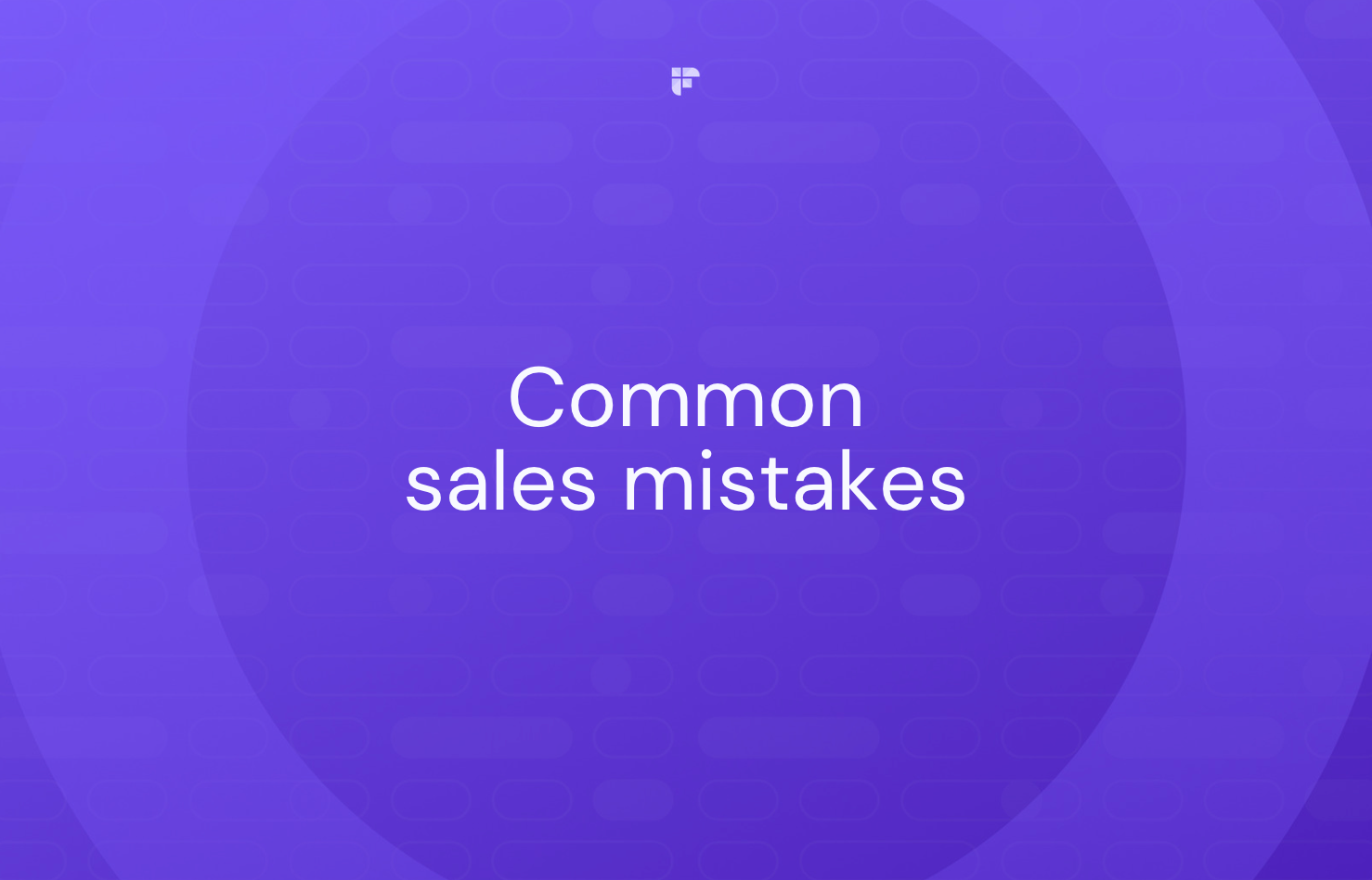You want your lion's share of enterprise sales—unique opportunities and enormous revenue—but closing deals with corporate giants can be a mountain too high to climb.
If you feel this way, you're not alone.
Many B2B sales teams find themselves at this juncture, and rest assured, with proper strategy and meticulous execution, you can successfully navigate the intricacies of the enterprise market.
This guide explores everything you need to know about enterprise sales to reach your goals and close more deals faster.
Plus, we will introduce you to an AI tool that can be integrated with your CRM for data-driven insights into crucial sales meetings.

What is enterprise sales?

Enterprise sales refer to selling products or services to large corporations and organizations, often called "enterprises."
These enterprises are typically sizable, established businesses, government agencies, or institutions with complex needs and significant resources.
Enterprise sales are distinct from selling to small or medium-sized businesses because they involve more extensive negotiations, longer , and a deeper understanding of the customer's specific requirements.

Why is enterprise sales important?

Considering the amount of effort, the time it takes, and the level of complexity, you may think that enterprise sales is not for you. But that's not true.
As long as you're catering to a B2B segment, enterprise sales should be your goal now or in the near future. Here's why.
- Revenue generation: Enterprise sales directly contribute to revenue generation, making it a vital part of your company's financial success. Businesses can significantly boost their income by targeting larger organizations and securing long-term contracts. A well-executed enterprise sales strategy can open the doors to substantial deals that drive consistent, high-value revenue streams.
- Business expansion: Enterprise sales can be a strategic means of expanding your business horizons. You gain access to larger and more diverse customer bases when you successfully penetrate enterprise markets. This not only increases your reach but also diversifies your revenue sources, making your business more resilient to market fluctuations.
- Building long-term relationships: One of the primary benefits of enterprise sales is the opportunity to establish long-term relationships with customers. These relationships can lead to repeat business, upselling opportunities, and referrals. Building trust and delivering value to enterprise clients can result in partnerships that last for years, providing a stable foundation for your growth.
- Product and service improvement: Engaging with enterprise customers often necessitates tailoring products and services to meet their specific needs. This process of customization and continuous improvement can enhance your offerings, making them more competitive and valuable. It's a win-win situation – your clients get what they need, and your business evolves to stay ahead in the market.
- Brand credibility and reputation: Successfully closing enterprise sales deals with reputable organizations can significantly boost your brand's credibility and reputation. A track record of working with industry leaders or well-known enterprises can be a powerful endorsement, attracting more clients and partners.
- Market insights: Engaging with enterprise customers provides valuable insights into market trends, demands, and pain points. These insights can guide product development, marketing strategies, and business decisions. Understanding the needs and challenges of enterprise clients positions your business to address them effectively.
- Competitive advantage: Enterprise sales often involve facing fierce competition. Winning enterprise clients not only generates revenue but also gives you a competitive edge. It signifies that your products or services outperform your competitors, demonstrating your industry expertise and superior solutions.
Next-Gen Sales Success Begins with Fireflies
Effortlessly record, transcribe, summarize, and analyze all your online and in-person meetings at 90%+ accuracy.
- Customizable AI Super Summaries
- Conversation intelligence and meeting insights
- 40+ Exclusive integrations and custom API
- Advanced collaboration tools
- Zero-day data retention and private storage
7 Challenges of enterprise sales
Enterprise sales come with some challenges. And the larger the sales, the more complicated the process takes. Here are some of the difficulties you should expect during this sales model:
1. Longer sales cycles
Enterprise sales typically involve complex decision-making processes, and these can lead to extended sales cycles. Closing a deal may take several months or even years, making it crucial for sales teams to have patience and persistence.
2. Customization and complexity
Enterprises often require tailored solutions that can be complex to develop and deliver. Sales teams need to navigate these customization demands and ensure that the product or service aligns with the client's specific requirements.
3. Rigorous compliance and procurement procedures
Large organizations frequently have stringent procurement and compliance procedures. Navigating these requirements and ensuring that your offering complies with them can be challenging.

4. Resource allocation
Pursuing enterprise sales deals can require substantial resources in terms of time, personnel, and budget. Ensuring that resources are allocated optimally and that the potential return on investment justifies the effort is a constant challenge.

5. Risk management
Large contracts come with a level of risk. If a deal doesn't go as planned or a client faces issues, it can significantly impact your business. Managing and mitigating such risks is crucial.
6. Pricing negotiations
Determining the right pricing strategy for enterprise clients can be tricky. Balancing profitability with the client's budget and expectations is a delicate art that requires skillful negotiation.

7. Sustainability and Post-Sale Service
Maintaining long-term relationships with enterprise clients and ensuring the sustainability of the solutions you provide can be demanding. It's not just about making the sale but also about ongoing service and support.
Successfully navigating these challenges in enterprise sales often requires a combination of strategic planning, relationship-building, adaptability, and a deep understanding of the client's needs and the market.
It's a complex, high-stakes field that can be incredibly rewarding when approached effectively.

Understanding the 4 stages of enterprise sales
To succeed in this complex sales cycle, you must understand the four stages involved: discovery, diagnosis, design, and delivery.
1. Discover your prospect's problem
At this stage, you already have a list of the big clients you want to target. This is the time for your sales team to research these companies and find the key person to contact.
This should be followed by your first discovery calls, where you ask prospects several questions to:
- Understand their pain points.
- Know the solutions they've previously tried.
- Know their expectation for the new solution.
- Know those who are involved in the decision.
- Get an idea of their agenda for the decision, etc.
2. Diagnose their pain points
Once the discovery stage is completed, your sales reps should examine the answers supplied to questions.
This will give you a proper understanding of your prospect's pain points. Next, carefully consider how your product can seamlessly integrate as the ultimate solution to the identified problem(s).
If you don't want to lose your enterprise prospects to your competitors, don't tell them all the benefits of your product. Key in the only benefit that solves the problem.

3. Design the ultimate solution
Here, your sales reps will need to design a custom solution to meet the needs of the highlighted problems, regardless of the size and complexity. This solution will be sales demos, and once the work is done well, it will position your company as a trusted consultant. Plus, your reps can also distribute their design to as many stakeholders as possible.
4. Deliver the solution
Getting here might have taken a very long time, but at this stage, you should be able to deliver the solution without any stress. Reps need to use post-sales customer support—an essential function in enterprise sales—to deliver the design to the enterprise prospect.
4 Tips for enterprise sales success

Cracking enterprise sales is a challenging but highly rewarding endeavor. It involves selling complex products or services to large organizations, and success in this field requires a unique set of skills and strategies. Here are four tips:
1. Offer value, not just a product
Enterprise sales should focus on providing value rather than just selling a product or service.
Understand how your offering can solve customer problems, improve operations, or drive growth. Tailor your sales pitch to emphasize the unique value proposition your solution offers.
Highlight the return on investment (ROI) and demonstrate how your product or service can deliver tangible benefits to the customer's bottom line. Present case studies, testimonials, and real-world examples to support your claims.
2. Understand the customer's needs
Before approaching any enterprise client, it's crucial to thoroughly understand their business, industry, pain points, and objectives. Take the time to research and analyze their specific needs, challenges, and goals.
This knowledge will enable you to tailor your sales pitch and solutions to address their unique requirements. Building a deep understanding of the customer's business demonstrates your commitment to their success and builds trust.
3. Collaborate and customize
Large organizations often have specific requirements and processes in place. Be prepared to collaborate with the customer to customize your solution to fit their needs.
This may involve adapting your product or service, integrating it with their existing systems, or addressing regulatory and compliance concerns.
By showing a willingness to work together to create a tailored solution, you can differentiate yourself from competitors and increase your chances of success in enterprise sales.
4. Build strong relationships
Enterprise sales often involve long and complex sales cycles. Building and maintaining strong relationships with key decision-makers within the organization is essential.
These relationships can help you navigate the organization's hierarchy, gain insights into their decision-making processes, and secure buy-in from stakeholders.
Building trust and rapport with your clients is an ongoing process that requires consistent communication, transparency, and responsiveness.
Read your prospects like an open book with Fireflies.ai
Closing a large business deal is not easy. But with a deep understanding of the customer's needs, strong relationship-building skills, and a focus on delivering value, you, too, can master this.
But you don't have to do this alone.
With Fireflies, you can seamlessly collect, save, and share insights on your prospects with your team.
This AI-powered tool streamlines enterprise sales by automatically transcribing meetings, extracting action items, and providing valuable insights into customer interactions. It improves follow-up and accountability, enhances data analytics, and supports knowledge sharing.
Its integration capabilities automate administrative tasks like entering notes into the CRM, enabling sales professionals to focus on building relationships, and the tool's searchable transcript database serves as a knowledge repository.

Additionally, it reduces miscommunication and disputes, improves time management, and offers a personalized customer experience by referencing past discussions, making it a valuable asset for complex enterprise sales processes.









